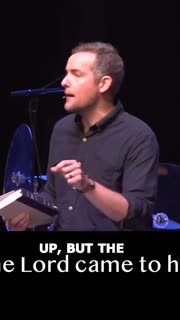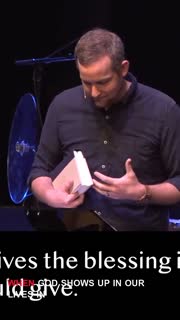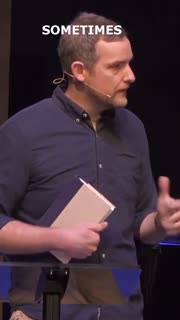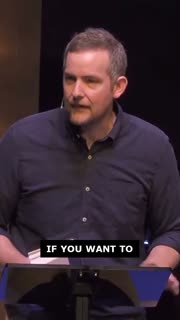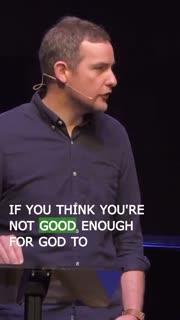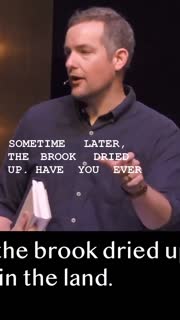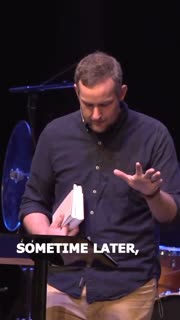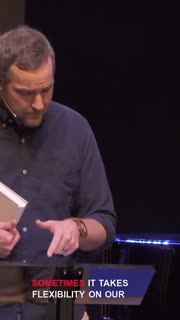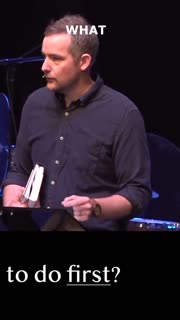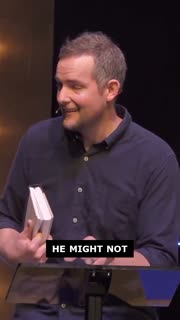Elijah: Faith, Provision, and Miracles in Crisis
Devotional
Sermon Summary
Bible Study Guide
Sermon Clips
### Quotes for outreach
1. "The brook dried up, but the source didn't. The gift was gone, but the giver was just getting started. And I wonder, do you find yourself, living sometimes more for God's blessings than for God himself? Because the God who gives the blessing is better than any blessing he could give." [33:42] (19 seconds)
2. "When God shows up in our lives in powerful ways, it can sustain us through the hardest times. But when the blessing, the blessing is gone, God isn't gone. And the thing that actually sustains you in the hardest of times is God himself, guiding you along the way, walking with you every step, meeting you with new mercy every single morning." [34:14] (21 seconds)
3. "Sometimes the brook dries up, but it's better to know the voice of God than live by the brook your whole life. Elijah's blessing ran dry, but God's voice only grew louder. And Elijah had come to know and trust God, not just depend on the method that God used to care for him." [35:52] (18 seconds)
4. "If you want to hear more from God, then act on what he calls you to do. In my experience in my own life and in seeing it in others, when God gets a hold of someone who proves they're going to act on his voice, he tends to have a lot more to say." [41:00] (14 seconds)
5. "If you think you're not good enough for God to work in your life, then you're probably right where he wants you to be. If you think you've blown it and could never redeem it, then I think you're a great candidate. If you feel like you've tried and tried, but you just get so worn out from persevering on the way of Jesus, then you're exactly the kind of person he would love to strengthen." [55:47] (26 seconds)
### Quotes for members
1. "Sometime later, the brook dried up. Have you ever received a blessing from God? Some kind of provision? Some kind of proof of his power in your life? His presence? Something from him? And it dried up. I imagine Elijah sitting by this brook and like almost seeing God's face in the reflection of the water. Like this is God's direct gift to Elijah. Elijah didn't just draw water from that brook. He drew joy and peace and hope from that brook. And sometime later, it dried up." [30:15] (36 seconds)
2. "Sometime later, discouragement can creep in, can't it? Sometime later, laziness can creep in. Sometime later, cynicism can creep in. Sometime later, you just get bored with the same old prayer habits and the same old thing over and over. And it's just sometime passes and it's not what it used to be. I think our enemy loves to sneak into our lives sometime later because he can't stop God from doing amazing things." [33:06] (25 seconds)
3. "Sometimes it takes flexibility on our part to be followers of God, doesn't it? He meets us one way for a while, then it doesn't work the same way anymore, but don't give up because God might be calling you to a new adventure." [36:29] (13 seconds)
4. "What do you need to do first? Sometimes I think God has really good things in store for us. Kingdom adventures for us. Amazing blessings waiting for us. We just need to be willing to take a step of faith first before we have all the answers. Elijah told this woman God would provide for her, but she didn't know that. I'm not sure she even knew God or believed in him at this point." [47:25] (23 seconds)
5. "He might not always do it, but he always might do it. So we pray with boldness and courage and resolve and perseverance. We don't give up. We don't lose hope. And if it doesn't turn out like we hoped, we know who he is. So we'll come back again the next time. And if it does turn out like we hoped, then we turn that back to praise because we know who he is and we'll come back again the next time." [52:43] (25 seconds)
Ask a question about this sermon
1. "The brook dried up, but the source didn't. The gift was gone, but the giver was just getting started. And I wonder, do you find yourself, living sometimes more for God's blessings than for God himself? Because the God who gives the blessing is better than any blessing he could give." [33:42] (19 seconds)
2. "When God shows up in our lives in powerful ways, it can sustain us through the hardest times. But when the blessing, the blessing is gone, God isn't gone. And the thing that actually sustains you in the hardest of times is God himself, guiding you along the way, walking with you every step, meeting you with new mercy every single morning." [34:14] (21 seconds)
3. "Sometimes the brook dries up, but it's better to know the voice of God than live by the brook your whole life. Elijah's blessing ran dry, but God's voice only grew louder. And Elijah had come to know and trust God, not just depend on the method that God used to care for him." [35:52] (18 seconds)
4. "If you want to hear more from God, then act on what he calls you to do. In my experience in my own life and in seeing it in others, when God gets a hold of someone who proves they're going to act on his voice, he tends to have a lot more to say." [41:00] (14 seconds)
5. "If you think you're not good enough for God to work in your life, then you're probably right where he wants you to be. If you think you've blown it and could never redeem it, then I think you're a great candidate. If you feel like you've tried and tried, but you just get so worn out from persevering on the way of Jesus, then you're exactly the kind of person he would love to strengthen." [55:47] (26 seconds)
### Quotes for members
1. "Sometime later, the brook dried up. Have you ever received a blessing from God? Some kind of provision? Some kind of proof of his power in your life? His presence? Something from him? And it dried up. I imagine Elijah sitting by this brook and like almost seeing God's face in the reflection of the water. Like this is God's direct gift to Elijah. Elijah didn't just draw water from that brook. He drew joy and peace and hope from that brook. And sometime later, it dried up." [30:15] (36 seconds)
2. "Sometime later, discouragement can creep in, can't it? Sometime later, laziness can creep in. Sometime later, cynicism can creep in. Sometime later, you just get bored with the same old prayer habits and the same old thing over and over. And it's just sometime passes and it's not what it used to be. I think our enemy loves to sneak into our lives sometime later because he can't stop God from doing amazing things." [33:06] (25 seconds)
3. "Sometimes it takes flexibility on our part to be followers of God, doesn't it? He meets us one way for a while, then it doesn't work the same way anymore, but don't give up because God might be calling you to a new adventure." [36:29] (13 seconds)
4. "What do you need to do first? Sometimes I think God has really good things in store for us. Kingdom adventures for us. Amazing blessings waiting for us. We just need to be willing to take a step of faith first before we have all the answers. Elijah told this woman God would provide for her, but she didn't know that. I'm not sure she even knew God or believed in him at this point." [47:25] (23 seconds)
5. "He might not always do it, but he always might do it. So we pray with boldness and courage and resolve and perseverance. We don't give up. We don't lose hope. And if it doesn't turn out like we hoped, we know who he is. So we'll come back again the next time. And if it does turn out like we hoped, then we turn that back to praise because we know who he is and we'll come back again the next time." [52:43] (25 seconds)
